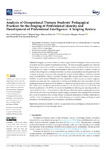Mostrar o rexistro simple do ítem
Analysis of occupational therapy students’ pedagogical practices for the forging of professional identity and development of professional intelligence: a scoping review
| dc.contributor.author | Souto Gómez, Ana Isabel | |
| dc.contributor.author | Talavera Valverde, Miguel Ángel | |
| dc.contributor.author | Márquez Álvarez, Luis Javier | |
| dc.contributor.author | García-de-la-Torre, María P. | |
| dc.date.accessioned | 2023-05-18T08:32:56Z | |
| dc.date.available | 2023-05-18T08:32:56Z | |
| dc.date.issued | 2023-02-28 | |
| dc.identifier.citation | Souto-Gómez AI, Talavera-Valverde MÁ, Márquez-Álvarez LJ, García-de-la-Torre MD. Analysis of occupational therapy students’ pedagogical practices for the forging of professional identity and development of professional intelligence: a scoping review. J Intell. 2023 Feb 28;11(3):48. | es_ES |
| dc.identifier.issn | 2079-3200 | |
| dc.identifier.uri | http://hdl.handle.net/2183/33086 | |
| dc.description | Review | es_ES |
| dc.description.abstract | [Abstract] Pedagogical practices contribute to enhancing professional intelligence which is an indicator of maturity and development of professional identity. The research guiding question was: What are the pedagogical practices involved in occupational therapy students' professional identity formation? A scoping review using a six-stage methodological framework was used to capture a variety of evidence describing how professional identity has been conceptualised and integrated into the occupational therapy curriculum while noticing a link to professional intelligence. Databases included were: Ovid MEDLINE, CINAHL, PsycINFO, ProQuest ERIC, Scopus, Web of Science, CSIC, Dialnet, PubMed, Pubmed Central, OTDBASE and Scielo. Qualitative content analysis was used to categorise learning outcomes into five components of professional identity that were associated with the pedagogical practices identified in the studies. n = 58 peer-reviewed journal articles were recorded. The articles were classified as intervention studies (n = 31; 53.4%), reviews (n = 12; 20.7%) and theoretical articles (n = 15; 25.9%). To ensure the feasibility of collecting and reporting results, we narrowed the focus to n = 31 intervention studies that provided information on pedagogical practices and learning outcomes on professional identity forging in students. This scoping review illustrates the variety of contexts in which students learn, the multiple dimensions of identity establishment, and the variety of pedagogical practices. These findings can be used to adapt and design focused formative curricula that support the development of professional identity. | es_ES |
| dc.language.iso | eng | es_ES |
| dc.publisher | MDPI | es_ES |
| dc.relation.uri | https://doi.org/10.3390/jintelligence11030048 | es_ES |
| dc.rights | Creative Commons Attribution 4.0 International License (CC-BY 4.0) | es_ES |
| dc.rights.uri | http://creativecommons.org/licenses/by/4.0/ | * |
| dc.subject | Intelligent professional development | es_ES |
| dc.subject | Learning contexts | es_ES |
| dc.subject | Occupational therapy | es_ES |
| dc.subject | Pedagogical practices | es_ES |
| dc.subject | Professional identity | es_ES |
| dc.subject | Students | es_ES |
| dc.title | Analysis of occupational therapy students’ pedagogical practices for the forging of professional identity and development of professional intelligence: a scoping review | es_ES |
| dc.type | info:eu-repo/semantics/article | es_ES |
| dc.rights.access | info:eu-repo/semantics/openAccess | es_ES |
| UDC.journalTitle | Journal of Intelligence | es_ES |
| UDC.volume | 11 | es_ES |
| UDC.issue | 3 | es_ES |
| UDC.startPage | 48 | es_ES |
Ficheiros no ítem
Este ítem aparece na(s) seguinte(s) colección(s)
-
UI-INTEGRA_SAUDE - Artigos [64]
-
II - Artigos [568]






